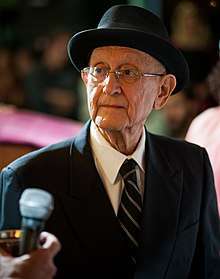Milton Polin
Milton H. Polin (October 7, 1930 – July 2, 2018) was an Orthodox rabbi who served in Brooklyn, New York, attained a number of distinctions in his life.

Born in Chicago, Illinois, he was the son of Dorothy and Abraham Polin, and the grandson of Sholom Polin and Sara (Shashaka) Rivka (Chernick).
Rabbi Polin studied at the Hebrew Theological College -- Beth Midrash L'Torah—in his native city, from which he received his ordination and bachelor of Hebrew literature degree cum laude. At his ordination, he was awarded a prize for his Hebrew essay 'Rabbi Joseph Albo and the Debate at Tortosa, 1413–14.' He also holds a master of arts degree in education from the University of Chicago.
Rabbi Polin spent his retirement in Israel with the rest of his family. He died on July 2, 2018, aged 87.
From the Congressional Record
In the Congressional Record for the 105th Congress (1997–1998), Senator Charles E. Schumer devoted a speech in the United States House of Representatives to Rabbi Polin on October 2, 1997, that noted Rabbi Milton H. Polin as spiritual leader of Brooklyn's Kingsway Jewish Center since 1974 and past president of the Rabbinical Council of America.
Ordained in the 1950s, his teachers characterized him as "a gifted young scholar who will inspire a profound reverence for Torah Judaism." More recently, he was paid tribute by the U.S. House of Representatives for being "a man highly esteemed and respected by Jews and Christians whose lives have been touched by numerous good works and kind deeds of this outstanding spiritual and civic leader."
His rabbinic leadership has transformed his congregation into a pulsating center of Torah learning and communal activity for hundreds of young, highly educated, religiously observant families. He personally teaches a variety of classes for men and women of all ages and backgrounds at his synagogue. During his presidency of the Rabbinical Council of America, he participated actively in the Conference of Presidents of Major American Jewish Organizations. After his presidency, he continued to maintain regular contact with the chief rabbis and government leaders in Israel.
He was active in the larger community in many capacities, Rabbi Polin was invited to join the Orthodox Caucus, an Orthodox think tank in North America, and the board of directors of the Beth Din of America.
A lifelong religious zionist, Rabbi Polin was national vice president of the Religious Zionists of America after previously serving as president of that organization's Greater New York Council. He was a member of the Rabbinic Advisory Council of the Jewish National Fund.
In the several communities he served, Rabbi Polin built a mikvah ("ritual bath"), an eruv (an area designated for carrying outdoors on the Jewish Sabbath), and two synagogues. His interest in kashruth ("dietary laws supervision") and responsibility for communal supervision long predated his chairmanship of the Rabbinic Kashruth Commission, the halakhic authority for the Union of Orthodox Jewish Congregations of America Kashruth Division. He served as chairman of the Kashruth Committee of the Vaad Harabbanim of Flatbush.
Rabbi Polin was a trustee of the international Memorial Foundation for Jewish Culture. He was vice president of the Coordinating Council on Bikur Cholim of Greater New York. Previously he had served as chaplain of the Kings County Council of the Jewish War Veterans and as a member of both the rabbinic advisory and the executive councils of the Commission on Synagogue Relations, which are agencies of the UJA-Federation of the Jewish Philanthropies of New York. He chaired the Committee on the Public Information and Education of the Task Force on Missionary Activities of the Jewish Community Relations Council of New York.
Rabbi Polin served two terms as president of the 90-member Vaad Harabbanim of Flatbush and chaired its Jubilee Anniversary celebration. He participated actively on the Board of Education of the Yeshiva of Flatbush for many years.
With his wife, Shainee, he was sent to the former Soviet Union more than two decades ago when Jews were not allowed to leave. They shared their experiences, insights, and concerns for Soviet Jews in several forums. It was this experience that sensitized them to the special needs of today's new American families.
An eloquent speaker and acclaimed scholar, Rabbi Polin's sermons have appeared annually in the Rabbinical Council of America Sermon Anthology. Yeshiva University President Dr. Norman Lamm characterized his sermons as enlightening and creative. His scholarly articles have been published in such journals as `Judaism,' `Tradition,' and `The Hebrew Theological College Journal.' Several of his halakhic studies on Maimonides' Code has been published in Hadarom.
Rabbi Polin is listed in `Who's Who in World Jewry,' `Who's Who in Israel,' and `Jewish Personalities All Over the World,' and `Who's Who in Religion.' He was married to the former Shainee Sachs, with whom he had 5 children. He also had 18 grandchildren. Three of their children live in Israel, and 13 of their grandchildren are sabras (born in Israel).
Senator Schumer concluded:
- He never fails to leave me inspired by his words and honored by his presence. After 43 years of outstanding congregational and communal leadership throughout the country, he retires from his dedicated and faithful service. Rabbi Polin leaves behind a legacy that has touched us all in so many ways and at so many levels. Thank you, Rabbi, for being such an inspiration.